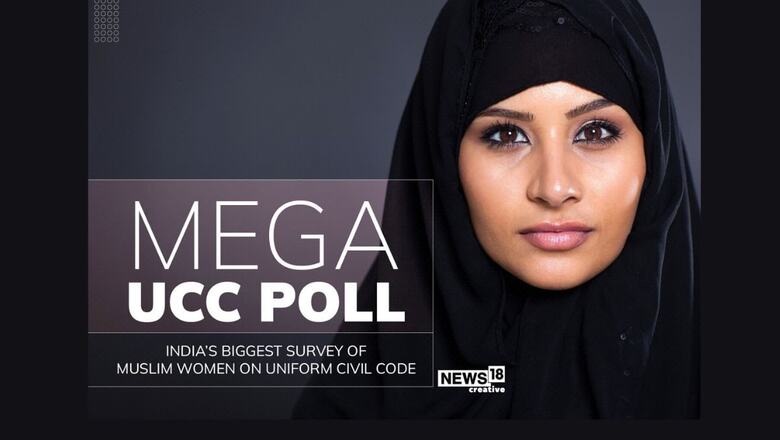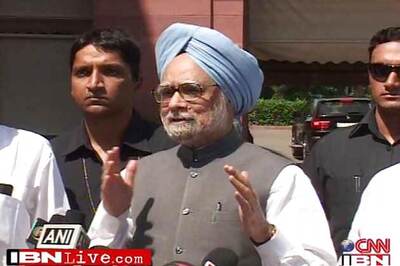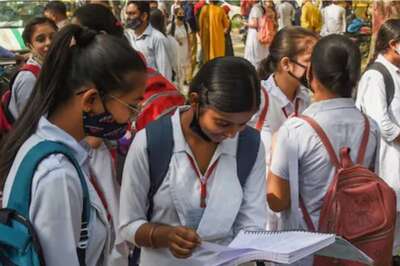
views
In the multicultural and multi-religious landscape of India, where personal laws govern the lives of citizens based on their religious affiliations, the idea of a Uniform Civil Code (UCC) has been a subject of heated debate for decades. However, a recent survey conducted by News18 illuminates a promising shift in the attitudes of Muslim women in India, indicating robust support for the principles central to the proposed UCC.
The survey shatters widely held stereotypes and misconceptions about the perspective of Muslim women on personal law issues. It shows that a considerable majority supports the introduction of common laws pertaining to marriage, divorce, adoption, and inheritance. The degree of consensus, surprising to some, underscores the changing paradigms within a community often thought to be resistant to such ideas and should serve to silence sceptics and in particular male-dominated bodies like the All India Muslim Personal Law Board (AIMPLB).
To understand what the Muslim women think of the provisions that are likely to be at the core of a UCC, 884 reporters from the News18 network interviewed 8,035 Muslim women across 25 states and Union Territories. It was not a poll done on social media. Every participant was personally reached by a reporter.
The respondents represented a cross-section of female Muslims across different demographics. The survey participants included those 18 years and above to those above 65. Right from the illiterate to the post-graduate, the survey captured a wide educational diversity.
The participants were given the choice to remain anonymous. But 90 percent of them willingly gave their names. Each surveyor (reporter) interviewed on average only nine Muslim women for purposes of higher accuracy.
The seven key questions asked in this survey did not mention a Uniform Civil Code. These were strictly limited to only the themes that the UCC is likely to cover. The survey was conducted to better understand Muslim women’s perspectives on these issues.
Key findings of the survey
The survey reveals that a remarkable 67 percent of all Muslim women respondents, with a slightly higher percentage (68 percent) among graduate and above respondents, favour a common law applicable to all Indians. This response points to an evolving consciousness, a shift towards seeing the merit in a legal framework that unites rather than divides, a step towards greater legal cohesion that transcends religious, caste, and community barriers.
A recurrent contentious issue in debates about Muslim Personal Law is polygamy. Here, too, the survey offers an unambiguous perspective: a significant 76 percent of all Muslim women respondents, and an even higher 79 percent among graduates and above, disapprove of polygamy. This trend indicates a strong movement towards embracing monogamy, a shift that cannot be understated in its social implications and the impact the practice of polygamy has on Muslim women.
When asked about the equal rights of succession and inheritance of property irrespective of gender, the response was overwhelmingly positive. As many as 82 percent of all respondents, and 86 percent of the graduate and above demographic, favoured gender equality in inheritance laws. This figure mirrors a growing call for breaking down patriarchal norms in property inheritance, extending the ethos of equality to all areas of personal law.
In the context of divorce and remarriage, 74 percent of all respondents believe that divorced couples should be able to remarry without any restrictions, suggesting an increasingly liberal stance on second marriages within the Muslim community and a rejection of the practice of Nikah Halala, which states a woman must marry another man, consummate her marriage, then divorce him and post three months of waiting, re-marry her first husband. This has proven to be an extremely exploitative practice and Muslim women have raised objections to it and even approached the court, the AIMPLB, however, challenges their stance.
The survey’s findings are not uniformly high across all issues. When it comes to adoption, the level of agreement drops to 65 percent for all respondents and 69 percent for the graduate and above segment. While these numbers still represent a majority, the comparatively lower agreement underscores the complexities and deeply ingrained cultural nuances around adoption.
One of the survey’s key revelations is the strong support for the freedom to will away property as per an individual’s wishes, with 69 percent of all respondents and 73 percent of graduate+ respondents supporting this idea. This reflects an aspiration for increased autonomy and personal freedom in property matters.
Additionally, the survey highlights overwhelming support for increasing the minimum age for marriage to 21 for both men and women, backed by 79 percent of all Muslim women respondents and 82 percent of those with a graduate or higher degree. This aligns with recent policy shifts and amplifies the collective voice for delaying marriage in favour of education and career growth, thereby empowering Muslim women and giving them more control over their lives. This is an ongoing battle, as recently as in January this year, the Supreme Court had to intervene when NCPCR raised an objection about the Haryana and Tamil Nadu High Court judgements that held that Muslim girls attained puberty at 15 and were hence legally eligible to be married off. These glaring violative issues do the rounds of courts, even though women from the community overwhelming want to protect young girls from child marriage. A UCC would settle this matter once and for all.
In conclusion, the insightful findings of the News18 survey illustrate a picture of Muslim women ready to embrace legal reforms that provide greater gender equality and personal freedom, transcending traditional, religious and social barriers. This unequivocal support for a UCC displayed by the survey should significantly inform the ongoing dialogue around the topic, bringing to the fore the fact that Muslim women, an essential stakeholder in this discourse, are not only ready for change but are actively advocating for it.
Advaita Kala is a best-selling novelist and award winning screenwriter. The views expressed in this article are those of the author and do not represent the stand of this publication.


















Comments
0 comment